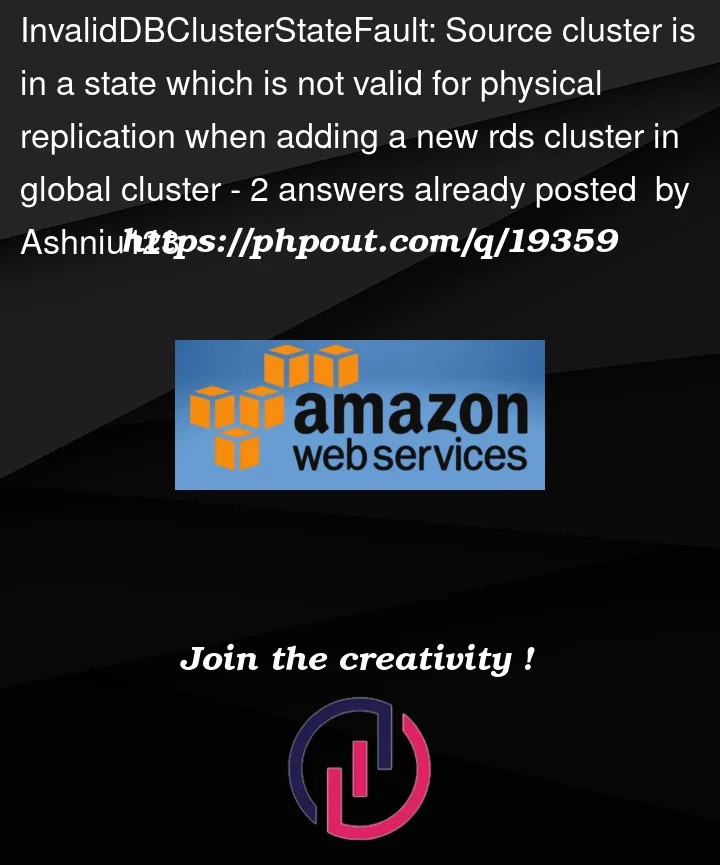I am using Terraform to setup RDS Global Cluster in 2 regions – us-east-1 and us-east-2. Engine is "aurora-postgres" and engine_version is "13.4".
I already had an existing cluster in us-east-1 made without Terraform, which I imported into terraform, and now want to create a global cluster with another cluster in us-east-2. So I am following this part of the aws-provider docs
Here is what my current hcl looks like:
# provider.tf
terraform {
required_providers {
aws = {
source = "hashicorp/aws"
version = "~> 4.0"
}
}
}
provider "aws" {
alias = "useast1"
region = "us-east-1"
assume_role {
role_arn = var.TF_IAM_ROLE_ARN
}
}
provider "aws" {
alias = "useast2"
region = "us-east-2"
assume_role {
role_arn = var.TF_IAM_ROLE_ARN
}
}
# rds.tf
locals {
rds-monitoring-role_arn = "iam role for rds monitoring"
kms_key_id = {
"us-east-1" : "aws managed rds key arn in us-east-1"
"us-east-2" : "aws managed rds key arn in us-east-2"
}
}
resource "aws_rds_global_cluster" "global-lego-production" {
global_cluster_identifier = "global-lego-production"
force_destroy = true
source_db_cluster_identifier = aws_rds_cluster.lego-production-us-east-1.arn
lifecycle {
ignore_changes = [
engine_version,
database_name
]
}
}
resource "aws_rds_cluster" "lego-production-us-east-1" {
provider = aws.useast1
engine = "aurora-postgresql"
engine_version = "13.4"
cluster_identifier = "lego-production"
master_username = "nektar"
master_password = var.RDS_MASTER_PASSWORD
database_name = "lego"
db_subnet_group_name = module.us-east-1.rds-lego-prod-subnet-group-id
db_cluster_parameter_group_name = module.us-east-1.rds-lego-production-parameter-group-id
backup_retention_period = 7
storage_encrypted = true
kms_key_id = local.kms_key_id.us-east-1
copy_tags_to_snapshot = true
deletion_protection = true
skip_final_snapshot = true
iam_database_authentication_enabled = true
enabled_cloudwatch_logs_exports = ["postgresql"]
vpc_security_group_ids = [
module.us-east-1.rds-db-webserver-security-group-id,
module.us-east-1.rds-db-quicksight-security-group-id
]
tags = {
vpc = "nektar"
}
lifecycle {
ignore_changes = [
engine_version,
global_cluster_identifier
]
}
}
resource "aws_rds_cluster_instance" "lego-production-us-east-1-instance-1" {
provider = aws.useast1
engine = aws_rds_cluster.lego-production-us-east-1.engine
engine_version = aws_rds_cluster.lego-production-us-east-1.engine_version
identifier = "lego-production-instance-1"
cluster_identifier = aws_rds_cluster.lego-production-us-east-1.id
instance_class = "db.r6g.4xlarge"
db_subnet_group_name = module.us-east-1.rds-lego-prod-subnet-group-id
monitoring_role_arn = local.rds-monitoring-role_arn
performance_insights_enabled = true
performance_insights_kms_key_id = local.kms_key_id.us-east-1
performance_insights_retention_period = 7
monitoring_interval = 60
tags = {
"devops-guru-default" = "lego-production"
}
lifecycle {
ignore_changes = [
instance_class
]
}
}
resource "aws_rds_cluster_instance" "lego-production-us-east-1-instance-2" {
provider = aws.useast1
engine = aws_rds_cluster.lego-production-us-east-1.engine
engine_version = aws_rds_cluster.lego-production-us-east-1.engine_version
identifier = "lego-production-instance-1-us-east-1b"
cluster_identifier = aws_rds_cluster.lego-production-us-east-1.id
instance_class = "db.r6g.4xlarge"
db_subnet_group_name = module.us-east-1.rds-lego-prod-subnet-group-id
monitoring_role_arn = local.rds-monitoring-role_arn
performance_insights_enabled = true
performance_insights_kms_key_id = local.kms_key_id.us-east-1
performance_insights_retention_period = 7
monitoring_interval = 60
tags = {
"devops-guru-default" = "lego-production"
}
lifecycle {
ignore_changes = [
instance_class
]
}
}
resource "aws_rds_cluster" "lego-production-us-east-2" {
provider = aws.useast2
engine = aws_rds_cluster.lego-production-us-east-1.engine
engine_version = aws_rds_cluster.lego-production-us-east-1.engine_version
cluster_identifier = "lego-production-us-east-2"
global_cluster_identifier = aws_rds_global_cluster.global-lego-production.id
db_subnet_group_name = module.us-east-2.rds-lego-prod-subnet-group-id
db_cluster_parameter_group_name = module.us-east-2.rds-lego-production-parameter-group-id
backup_retention_period = 7
storage_encrypted = true
kms_key_id = local.kms_key_id.us-east-2
copy_tags_to_snapshot = true
deletion_protection = true
skip_final_snapshot = true
iam_database_authentication_enabled = true
enabled_cloudwatch_logs_exports = ["postgresql"]
vpc_security_group_ids = [
module.us-east-2.rds-db-webserver-security-group-id,
module.us-east-2.rds-db-quicksight-security-group-id
]
tags = {
vpc = "nektar"
}
depends_on = [
aws_rds_cluster.lego-production-us-east-1,
aws_rds_cluster_instance.lego-production-us-east-1-instance-1,
aws_rds_cluster_instance.lego-production-us-east-1-instance-2
]
lifecycle {
ignore_changes = [
engine_version
]
}
}
resource "aws_rds_cluster_instance" "lego-production-us-east-2-instance-1" {
provider = aws.useast2
engine = aws_rds_cluster.lego-production-us-east-1.engine
engine_version = aws_rds_cluster.lego-production-us-east-1.engine_version
identifier = "lego-production-instance-1"
cluster_identifier = aws_rds_cluster.lego-production-us-east-2.id
instance_class = "db.r6g.4xlarge"
db_subnet_group_name = module.us-east-2.rds-lego-prod-subnet-group-id
monitoring_role_arn = local.rds-monitoring-role_arn
performance_insights_enabled = true
performance_insights_kms_key_id = local.kms_key_id.us-east-2
performance_insights_retention_period = 7
monitoring_interval = 60
tags = {
"devops-guru-default" = "lego-production"
}
lifecycle {
ignore_changes = [
instance_class
]
}
}
When applying it with terraform plan -out tfplan.out and then terraform apply tfplan.out (the initial plan only showed adding the 3 resources – aws_rds_global_cluster, aws_rds_cluster & aws_rds_cluster_instance in us-east-2)…
The Global Cluster was created successfully (as seen in the AWS Console). But the RDS Cluster in us-east-2 is failing due to the error InvalidDBClusterStateFault: Source cluster: arn:aws:rds:us-east-1:<account-id>:cluster:lego-production is in a state which is not valid for physical replication.
I tried the same thing using just the AWS Console (without terraform, "Add Region" through the "Modify" option on selecting the Global Cluster), and it shows the same error.
What criteria is missing for adding another region to my global cluster? It certainly isn’t just terraform acting up. And I couldn’t find any other places on the internet where somebody encountered the same error.
If there is any other information that I should provide, pls comment.




2
Answers
It took me the AWS Developer Support Plan to resolve this.
The reason for the error
InvalidDBClusterStateFaultis pretty straighforward apparently - there are some pending changes to the cluster, to be applied at the next maintenance window.That's it! To view the pending changes you can run the following command:
aws rds describe-db-clusters --db-cluster-identifier lego-production --query 'DBClusters[].{DBClusterIdentifier:DBClusterIdentifier,PendingModifiedValues:PendingModifiedValues}'In my case, some changes made through terraform were gonna be applied at the next maintenance window. I had to add the following line in my
aws_rds_clusterresource block to apply the aforementioned changes - immediately:And the same had to be done for resource block
lego-production-us-east-2also, just to be sure.Once I applied these changes, the cluster addition to the global cluster took place as expected.
You are referencing your useast2 cluster engine to useast1 which has a provider of useast1, which is trying to replicate the same thing.
You should create an additional resource such as
"aws_rds_cluster" "lego-production-us-east-2"and provide the same information but enter useast2 as a provider.For example,for your useast2 cluster you have:
Notice your engine is pointing to your useast1 cluster. Reference your engine and engine_version to a new rds cluster which will include your useast2 alias.
Let me know if this works.